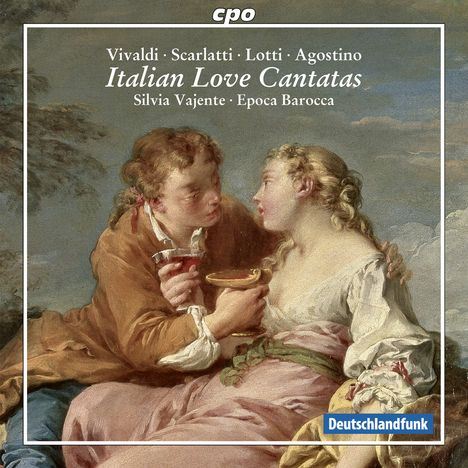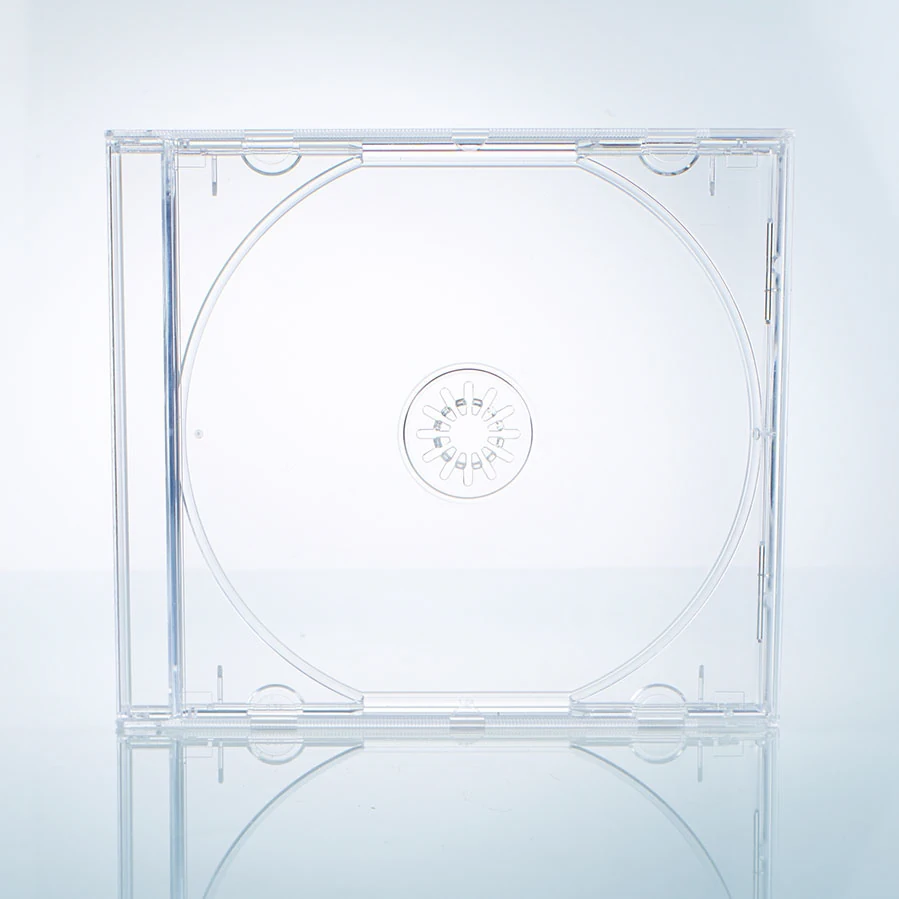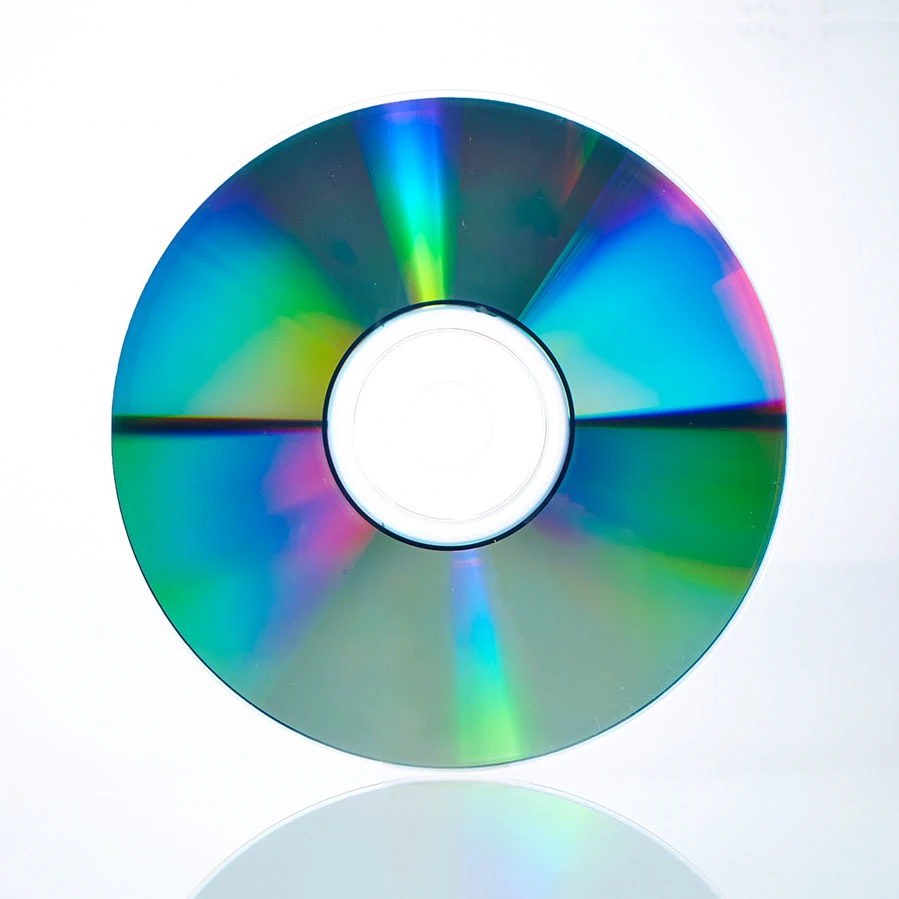Silvia Vajente - Italian Love Cantatas auf CD
Silvia Vajente - Italian Love Cantatas
Mit Werken von:
Agostino Steffani (1654-1728)
, Antonio Vivaldi (1678-1741)
, Antonio Lotti (1666-1740)
, Domenico Scarlatti (1685-1757)
, Francesco Mancini (1672-1737)
, Antonio Maria Bononcini (1677-1726)
Mitwirkende:
Silvia Vajente, Epoca barocca
CD
CD (Compact Disc)
Herkömmliche CD, die mit allen CD-Playern und Computerlaufwerken, aber auch mit den meisten SACD- oder Multiplayern abspielbar ist.
Derzeit nicht erhältlich.
Lassen Sie sich über unseren eCourier benachrichtigen, falls das Produkt bestellt werden kann.
Lassen Sie sich über unseren eCourier benachrichtigen, falls das Produkt bestellt werden kann.
-
Steffani: Spezza amor l'arco
+Vivaldi: All' ombra di sospetto
+Lotti: Ti sento o Dio bendato
+Scarlatti: Di fille vendicarmi vorrei
+Mancini: Quanto dolce e quell' ardore
+Bononcini: Idol mi bel tesoro
- Künstler:
- Silvia Vajente, Epoca barocca
- Label:
- CPO, DDD, 2007/2008
- UPC/EAN:
- 0761203758326
- Erscheinungstermin:
- 24.1.2012
Ähnliche Artikel
Produkttext
Liebeskantaten aus Bella Italia
Als eines von zwei »singenden« Blasinstrumenten neben der Traversflöte eroberte die Oboe im frühen 18. Jahrhundert damals nicht nur die Orchester, sondern auch die intimeren Ensembles, die unter anderem in der sogenannten Kammerkantate für Singstimme und kleiner Instrumentalbegleitung von wesentlicher Bedeutung waren. Vielfach wird die Oboe dabei als wortloser Partner der Sänger verwendet – und dieser besondere Reiz des poetischen Dialogs ist hier mustergültig von einigen der bekanntesten Meister des italienischen Barock zu hören. Die Liebe bietet der Musik einen unerschöpflichen Fundus an Gemütsregungen und ein barocker Meister beispielsweise konnte seinen Einfallsreichtum anhand von tönenden Affekten beweisen – und zwar unter anderem eben in der »Kammerkantate«. Dem Ensemble Epoca Barocca steht auf vorliegender CD-Neuheit die temperamentvoll deklamierende Sopranistin Silvia Vajente zur Seite, die in den Kantaten mit der Oboe wirklich sehr intensive Dialog bestreitet, z. B. in Antonio Lottis »Ti sento o Dio bendato«, und sie ist damit bestens vertraut, denn sie wurde ursprünglich auf der Oboe ausgebildet. Die Sängerin besticht vor allem durch zart anschwellende Töne und durch sanft touchierte, behutsam abgefederte Phrasenschlüsse. Barocke Kunst vom Feinsten!
Love Cantatas from Bella Italia
As one of the two »singing wind instruments, « together with the transverse flute, the oboe not only conquered orchestras during the early eighteenth century but also the more intimate ensembles, which were of considerable importance in forms such as the so-called chamber cantata for voice with a compact instrumental accompaniment. The oboe was often employed as a wordless partner of the singer – and the special appeal of such poetic dialogue is presented here in exemplary fashion by some of the best-known masters of the Italian baroque. Love offers music inexhaustible resources for the expression of the emotions, and a baroque master, for instance, could demonstrate his imaginative richness by drawing on musical affections in forms including the chamber cantata. The soprano Silvia Vajente, known for her temperamental declamation, joins the Epoca Barocca ensemble on the present CD, and in the cantatas with the oboe she engages in what are genuinely highly intensive dialogues – for example, in Antonio Lotti's »Ti sento o Dio bendato.« And she is very familiar with the oboe inasmuch as she was originally trained on this instrument. The vocalist captivates the listener above all with her tenderly swelling tones and with her gently finished, carefully cushioned phrase conclusions. Baroque artistry at its finest
Als eines von zwei »singenden« Blasinstrumenten neben der Traversflöte eroberte die Oboe im frühen 18. Jahrhundert damals nicht nur die Orchester, sondern auch die intimeren Ensembles, die unter anderem in der sogenannten Kammerkantate für Singstimme und kleiner Instrumentalbegleitung von wesentlicher Bedeutung waren. Vielfach wird die Oboe dabei als wortloser Partner der Sänger verwendet – und dieser besondere Reiz des poetischen Dialogs ist hier mustergültig von einigen der bekanntesten Meister des italienischen Barock zu hören. Die Liebe bietet der Musik einen unerschöpflichen Fundus an Gemütsregungen und ein barocker Meister beispielsweise konnte seinen Einfallsreichtum anhand von tönenden Affekten beweisen – und zwar unter anderem eben in der »Kammerkantate«. Dem Ensemble Epoca Barocca steht auf vorliegender CD-Neuheit die temperamentvoll deklamierende Sopranistin Silvia Vajente zur Seite, die in den Kantaten mit der Oboe wirklich sehr intensive Dialog bestreitet, z. B. in Antonio Lottis »Ti sento o Dio bendato«, und sie ist damit bestens vertraut, denn sie wurde ursprünglich auf der Oboe ausgebildet. Die Sängerin besticht vor allem durch zart anschwellende Töne und durch sanft touchierte, behutsam abgefederte Phrasenschlüsse. Barocke Kunst vom Feinsten!
Product Information
Love Cantatas from Bella Italia
As one of the two »singing wind instruments, « together with the transverse flute, the oboe not only conquered orchestras during the early eighteenth century but also the more intimate ensembles, which were of considerable importance in forms such as the so-called chamber cantata for voice with a compact instrumental accompaniment. The oboe was often employed as a wordless partner of the singer – and the special appeal of such poetic dialogue is presented here in exemplary fashion by some of the best-known masters of the Italian baroque. Love offers music inexhaustible resources for the expression of the emotions, and a baroque master, for instance, could demonstrate his imaginative richness by drawing on musical affections in forms including the chamber cantata. The soprano Silvia Vajente, known for her temperamental declamation, joins the Epoca Barocca ensemble on the present CD, and in the cantatas with the oboe she engages in what are genuinely highly intensive dialogues – for example, in Antonio Lotti's »Ti sento o Dio bendato.« And she is very familiar with the oboe inasmuch as she was originally trained on this instrument. The vocalist captivates the listener above all with her tenderly swelling tones and with her gently finished, carefully cushioned phrase conclusions. Baroque artistry at its finest
-
Tracklisting
-
Details
-
Mitwirkende
Disk 1 von 1 (CD)
Spezza, Amor, l'arco (Kantate)
-
1 Arie: Spezza, Amor, l'arco
-
2 Rezitativ: Così dicea Fileno
-
3 Arie: Zeffiretti placidetti
-
4 Rezitativ: E ragion vuol che sia
-
5 Arie: Fortuna crudele
All'ombra di sospetto RV 678 (Kantate)
-
6 Rezitativ: All' ombra di sospetto
-
7 Arie: Avvezzo non è il core
-
8 Rezitativ: Oh quanti amanti
-
9 Arie: Mentiti contenti
Ti sento, o dio bendato (Kantate)
-
10 Arie: Ti sento, o dio bendato
-
11 Rezitativ: Non rifiuto i tuoi dardi
-
12 Fai soave il languir
-
13 Arie: Vieni pur, ferisci, impiaga
Di Fille vendicarmi (Kantate)
-
14 Arie: Di Fille vendicarmi
-
15 Rezitativ: Come puoi tanto
-
16 Arie: Se già mi saettasti
Quanto dolce à quell'ardore (Kantate für Sopran, Oboe und Basso continuo)
-
17 Arie: Quanto dolce è quell' ardore
-
18 Rezitativ: Pur che a sia vicina
-
19 Arie: Aprimi il petto
Idol mio, mio bel tesoro (Kantate)
-
20 Arie: Idol mio, mio bel tesoro
-
21 Rezitativ: Cinto di pieno amore
-
22 Arie: Io mi parto














